Mothers’ Nature
Motherhood as a Lens, Not a Limit
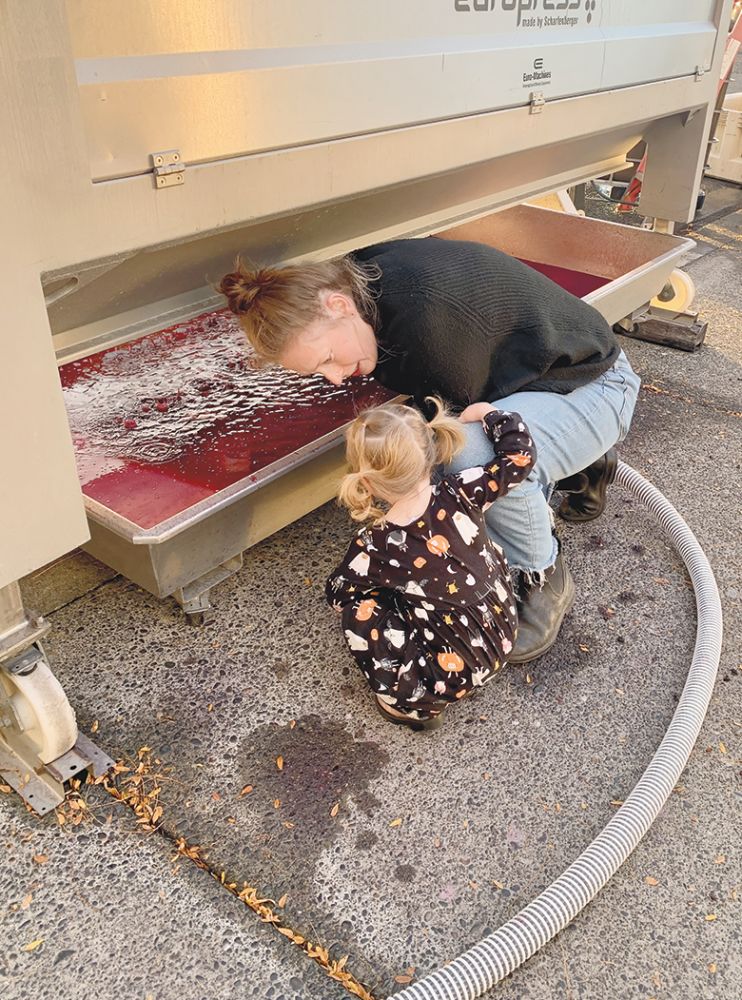
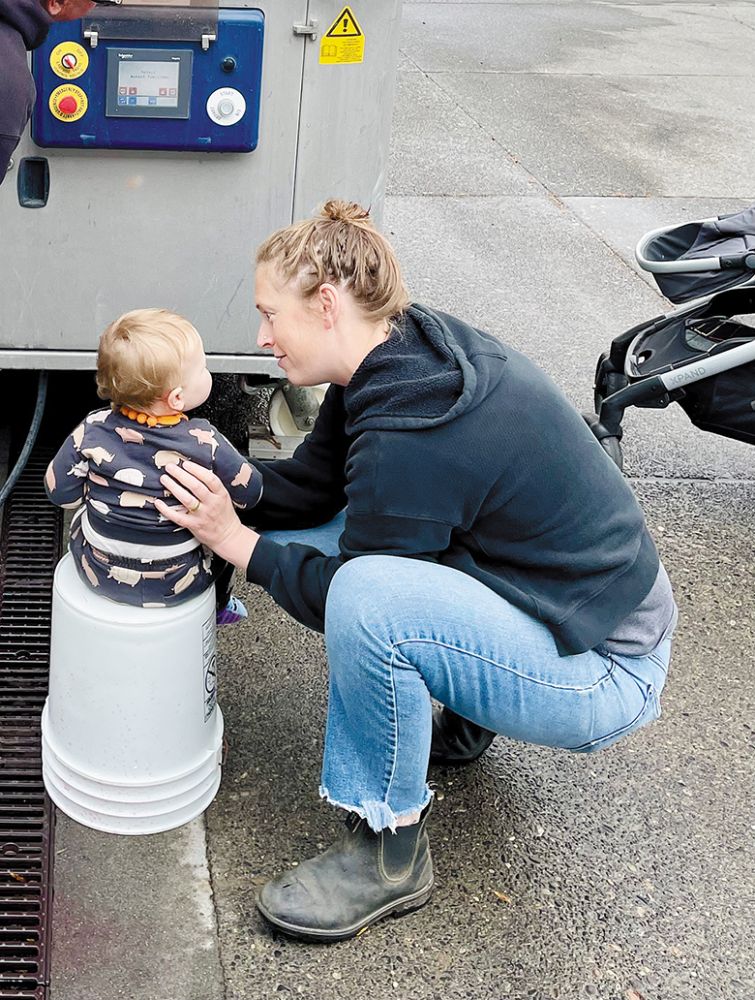
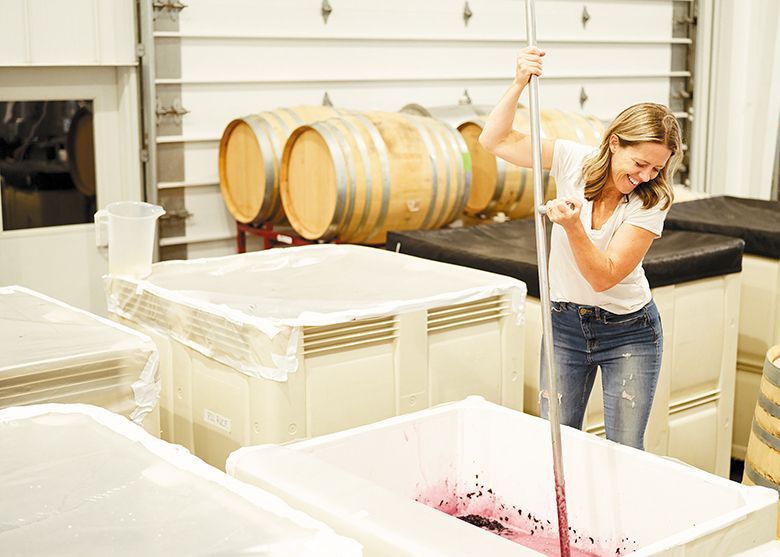
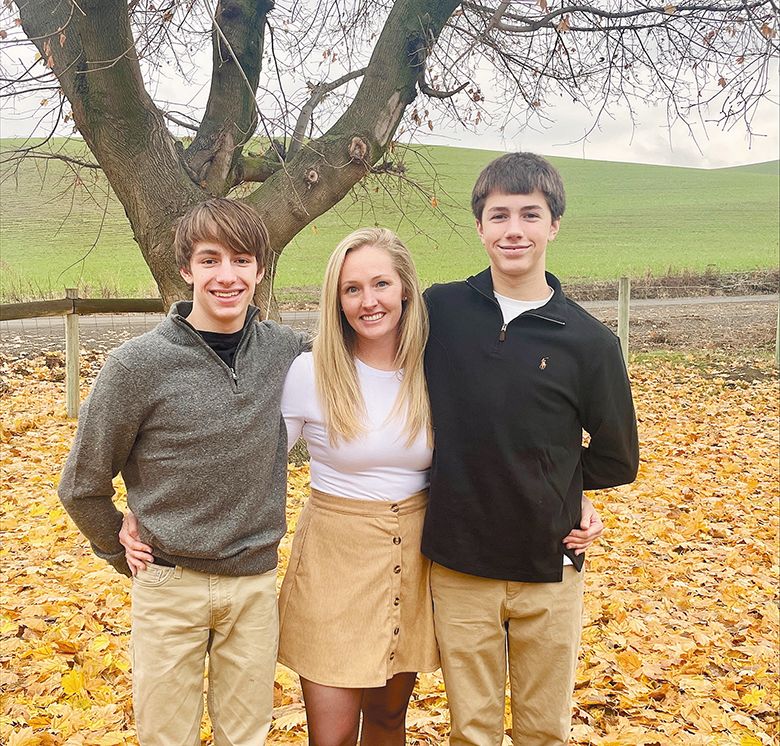
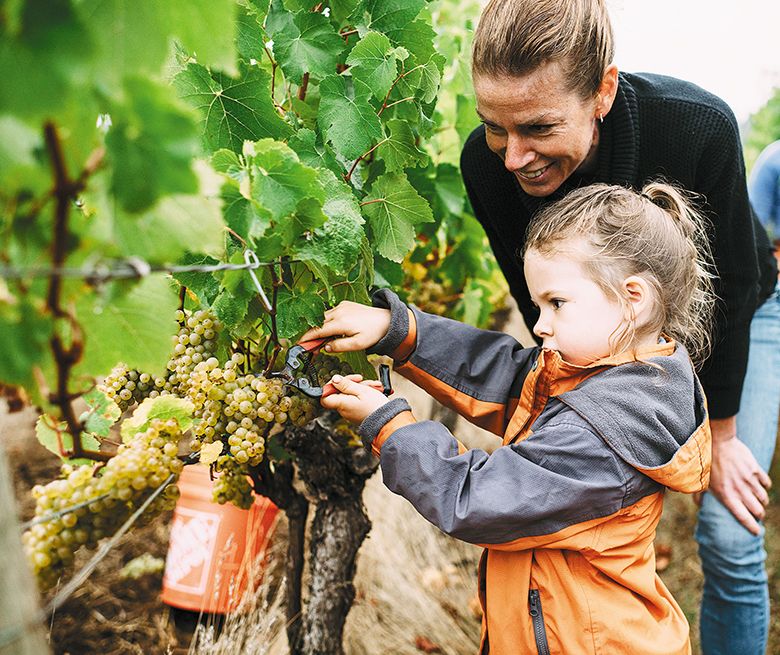
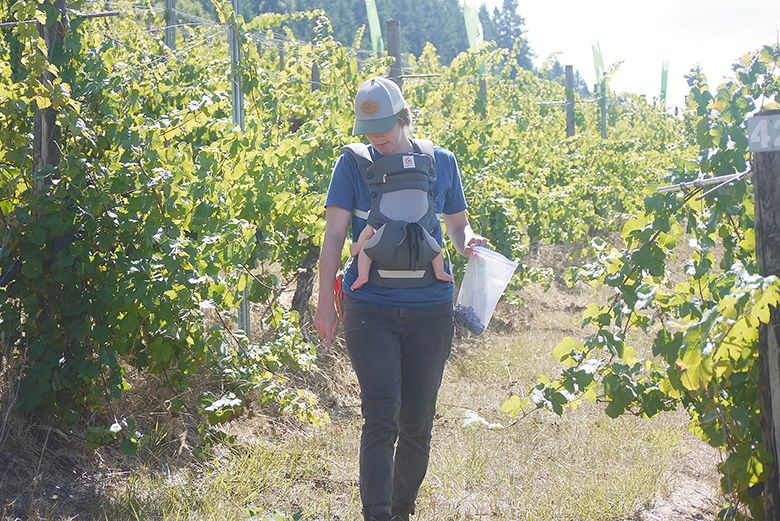
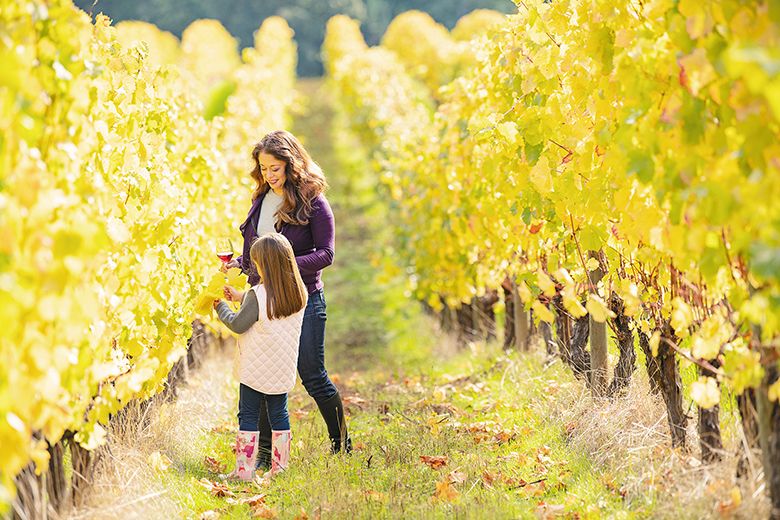
By Aakanksha Agarwal
Motherhood is often associated with several tired assumptions: lost ambition, fewer opportunities and an endless tug-of-war between work and family. Yet, for some, it’s the opposite– a sharpened focus, resiliency and exciting possibilities.
In Oregon’s vineyards, many female winemakers are breaking the mold. They’re breastfeeding at the sorting table, chasing toddlers through the vines and creating their stories through wine. Far from compartmentalizing work and motherhood, they’re blending the two remarkably.
The following women are reshaping the vineyard– and the concept of motherhood itself.
Kelsey Albro Itämeri at itä Wines
Harvest waits for no one– including newborns. For Kelsey Albro Itämeri, 2022’s harvest began four weeks after her daughter, August, was born “We called her Augie,” Itämeri says. “And, she was right there with me, bundled up in the vineyard.” While most families send out kitschy Christmas cards, Itämeri’s seasonal photo ops featured harvest-ready backdrops, grape bins and a baby strapped to her chest. Today, Augie, now a seasoned veteran of three vintages, is practically part of the vineyard crew. With another baby on the way, the Itämeri family’s tiny workforce is expanding even further.
Motherhood mixed with the chaos of harvest proved grounding as well as challenging. “I was lucky to work for myself,” she reflects. The flexibility allowed her to spend precious moments with her infant during those early days, often breastfeeding wherever and whenever– in the cellar, vineyard or at the sorting table. “Boobs out if needed,” she says. But self-employment also meant no paid maternity leave or benefits. “There was no structure to lean on. That reality is tough,” she admits.
Itämeri’s advocacy for improved support systems for mothers stems from this dichotomy. “We deserve more than merely getting by– we deserve to thrive.” Her decision to breastfeed publicly combined a necessity and quiet act of defiance. “I wasn’t going to let anyone’s discomfort dictate how I cared for my baby,” she says. For Itämeri, those early days weren’t solely about juggling motherhood and winemaking as much as normalizing the coexistence of both.
Itämeri now prepares for another messy, beautiful, inseparable season of work and family. She’s already devising ways to strap a baby carrier and wield pruning shears simultaneously.
Kate Derby at Spring Valley Vineyard
Kate Derby didn’t stumble into winemaking; she grew into it, one dusty summer after another on her grandparents’ Walla Walla farm. Sure, she pursued a psychology degree, but the vineyard called her back. A pivotal leadership event at Spring Valley Vineyard sealed the deal in 2011, pulling her into the family’s wine legacy. Around the same time, her sons Uriah and Malachi were born. “Uriah is named after my great-great-grandfather, the founder of our winery. Seeing them now take an interest in the vineyard feels like coming full circle,” she explains.
For Derby, motherhood and winemaking represent two sides of the same coin. “Like children, grapevines need care and nurturing to reach their potential,” she believes. Working with estate-grown fruit makes her intimately familiar with the vines– much like the connection to her boys, who couldn’t be more different. “Love brings them together, just like blending wine creates harmony from individual characteristics.”
Her children’s natural curiosity feeds her creative spark. “Children see the world with wonder and that sense of play rubbed off on me,” she said, prompting her to experiment with more inventive winemaking approaches.
Derby feels responsible for paving the way for other working moms. “Life is tough for us. I want others to know they’re not alone,” she says. She’s proud to act as an example to her sons in what remains a male-dominated industry. “Seeing their mom create space for women is a win in itself.”
Sustainability is another lesson she’s emphasizing. Derby openly discusses climate change with her kids, preparing them to be thoughtful of the vineyard’s future. “If they choose to continue this legacy, I want them to be responsible stewards of the land.”
One lasting memory? Harvesting with her boys in the cellar. “It took much longer to get the job done, but watching them get their hands dirty was worth it,” she says. “The most rewarding part is hearing my kids say how proud they are of me. My son once told me, ‘Mom, I don’t think I’ve ever seen anyone work as hard as you.’ That makes it all worth it.”
Ashley Trout at Brook & Bull Cellars and Vital Wines
Ashley Trout’s journey into winemaking began early, at 18 years old. The owner of Brook & Bull Winery, founder and president of nonprofit Vital Wines as well as mother of two, Trout balances her roles with clarity and intention. While she notes motherhood hasn’t directly influenced her winemaking or vineyard management, it plays a significant role in her community outreach.
“With Vital Wines, connecting with other moms breaks down barriers,” she says. “That shared bond begins conversations, allowing us to make real progress.” Trout believes strongly in the importance of modeling community engagement for her children, an 11-year-old son and 13-year-old daughter. “It’s crucial for kids to see their parents taking action to better the world. It’s not just about improving others’ lives– it enriches our own.”
Trout has held a strong commitment to equity throughout her career. “As a woman who hires, I receive more minority applicants; I lean into that,” she says. “I established this path early and hope it serves as an example for my children.” She sees her two children observing and internalizing these lessons in their own ways. “One has a great palate and is naturally social– perfect for sales and events– while the other has entrepreneurial instincts. It’s clear how their personalities align with certain aspects of the business, even if they choose not to take over Brook & Bull.”
Reflecting on her experiences as a mother in a male-dominated industry, Trout acknowledges a shift in workplace dynamics. “I see more men stepping into caregiving roles: changing diapers, staying home with sick kids, going to parent-teacher meetings. It’s created a greater sense of empathy, especially during demanding times like harvest,” she observes. “Where I once saw sympathy, I now see real understanding, and that support, from both men and women, makes all the difference.”
Michelle Wasner Seufert at Seufert Winery
Michelle Seufert’s first vintage for Seufert Winery coincided with the arrival of her eldest daughter in 2012, just weeks before harvest. Now with two daughters, ages 12 and 9, Seufert has mastered balancing family life with running a winery. “The decisions I make are for the prosperity of the next generation. There is no quitting,” she says.
Motherhood hasn’t merely shaped Seufert’s outlook: it’s emboldened her winemaking. “I launched our whole cluster fermentation program in 2013, and it’s now a cornerstone of our lineup,” she says. That willingness to take risks? Straight out of the mom playbook.
Community remains an important aspect of Seufert’s philosophy. “It takes a village to raise a family, and that’s inspired me to give back,” she says. Earlier this year, she founded a nonprofit, Performing Arts of Dayton, to bring performing arts to her town. Why just make wine?
Of course, the road hasn’t been without potholes. As a mother running a winery, Seufert has faced sexism and disrespect. “It changed how I work, who I employ and how I run the business–tenfold,” she says.
Sustainability provides the foundation for everything Seufert does. “Our children will inherit the Earth, so keeping climate change at the forefront is imperative,” she says. Her ultimate goal? To provide generational wealth and opportunity for her daughters, whether they want to run the winery or not. “One is very interested in the winery… and the other isn’t,” she says. Her hope is the business supports them whatever they want to be in life.
Tracy Kendall at Folly of Man Winery & Estate Vineyard
Motherhood, for Tracy Kendall, plays an integral role in her identity as a winemaker, shaping not just her philosophy but also the ground beneath her feet. “The soil is now our playground, the water at our vineyard is our well water and the health of our land is directly related to our family’s well-being,” she says. Watching her children, Isla and Max, plucking grapes as they run through the vines reinforces her commitment to sustainable, biodynamic farming. “I want them to farm this land and pass it on to their children. The only way to do so is by protecting it.”
Her children’s connection to nature extends beyond the vineyard. Kendall credits their outdoor preschool and the family garden with fostering an awareness of the Earth’s rhythms. “A difficult season can mean no carrots– Max’s favorite snack– or fewer cherry tomatoes, which he calls ‘garden candy,’” she explains. “They understand every decision we make, from farming to winemaking, impacts what we get in return.”
Launching Folly of Man with her husband, Aaron, is not just a professional venture– it’s personal. “We’ve designed our winery around our lives,” she says. This fact became especially apparent during harvest. “We woke the kids at 4:45 a.m., bundled them up, and brought them to the vineyard. They grabbed buckets and snips and started filling rows alongside the crew, laughing and singing. By the time we were sorting grapes, they were noticing earwigs, flicking away yellow jackets and eating more grapes than anyone their size should.”
For Kendall, these moments define the reason she does what she does. “Maybe it’s just wine, but perhaps it’s so much more– it’s about building something beautiful with them.”
Michelle Nicholl at Haines Creek Vineyard
“I was 31, with a nine-year-old daughter, searching for something creative… something tangible that would last,” recalls Michelle Nicholl. A job in the tasting room led to a harvest position. That experience left her hooked. “I fell head over heels– for winemaking and my now-husband– all at once.” Two years later, their story grew to include a new chapter: a son. “It’s been a beautiful whirlwind– so much learning, passion and hard work.”
Motherhood profoundly shaped Nicholl’s approach to farming and winemaking in profound ways. “It’s about slowing down, taking in life and walking at a pace you can share with your little ones,” she says. That philosophy influenced her decision to adopt a sprawling canopy management system inspired by South Australia. “The breezes kept everything dry, and we avoided the resource-intensive demands of the VSP system. The vines thrived, and we ended up with a stunning, disease-free vintage last harvest. We chose sustainability now and for generations to come.”
Nicholl’s role as a mother also unlocked new dimensions of creativity. “This year, we tripled our custom crush program, bringing in new clients, varieties and fruit from vineyards we hadn’t worked with previously,” she explains. “Every parcel of fruit is its own unique expression, just like every child. It’s so rewarding to collaborate with farmers and dreamers, creating wines as individual as the people behind them.”
Her vision extends beyond her family and winery to a vibrant rural community. A major goal is introducing viticulture education in local schools, giving agriculture students the chance to learn hands-on in the vineyard. “Even kids from families outside the wine industry can develop a love for the land and an understanding of sustainability.”
Jessica Mozeico at Et Fille Wines
Jessica Mozeico’s winemaking journey began with a sense of family loyalty. Co-founding Et Fille– meaning “and daughter”– with her father was one way to support his lifelong passion for wine after two decades of hobby winemaking. “Wine had never been on my radar professionally,” Mozeico says. “I worked in biotechnology, but when my dad asked me to co-found the winery, I couldn’t say no.”
After her father’s sudden death when her daughter Gabriella was only 18 months old, Mozeico became the sole owner. “Navigating her premature birth, then losing him, had a seismic effect on my values. I started living in alignment with nature and caring deeply about future impact.”
Motherhood shaped Mozeico’s approach to every facet of Et Fille. “The winery name reflects the parent-daughter relationship; it’s core to everything we do,” she says. After Gabriella’s birth, the winery became B Corp Certified, establishing a framework to expand the business sustainably, and with purpose. Mozerico wants it to reflect values of community and equity, both today, and for Gabriella’s generation, too, and many more to come.
Motherhood profoundly influenced Mozeico’s creativity as a winemaker. “I had given up hope of becoming a mom, so having Gabriella at 42 brought me gratitude and courage,” she explains. “We’ve launched six new wines in the last two years. That willingness to take risks and follow my intuition wouldn’t be possible without her.”
Gabriella, now nine, is already immersed in the winery’s daily operations. “She helps with everything– smelling wines in barrels, staying around me as I pour at tastings. Even if she doesn’t choose to continue the winery, working together gives me a sense of purpose. I always tell her, it’s so much more fun when we’re a team.”
Mozeico’s commitment to the future extends beyond family. Proceeds from the Gabriella Pinot Noir are donated to the Providence Portland Neonatal Intensive Care Unit, or NICU, where her daughter received life-saving care. “Without the NICU, there wouldn’t be Gabriella the girl or Gabriella the wine,” she says. Her vision also includes environmental sustainability, like bottling their 2023 wines in Revino glass to decrease carbon emissions. “I want Gabriella’s generation to inherit a world where today’s decisions have made a difference.”
Aakanksha Agarwal is a wine, travel and lifestyle writer from India. Formerly a Bollywood stylist, she now resides in the U.S., embracing writing full-time while juggling family life and indulging in her passions for cuisine, literature and wanderlust.










